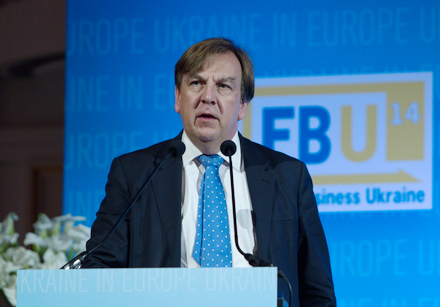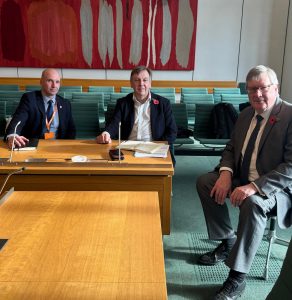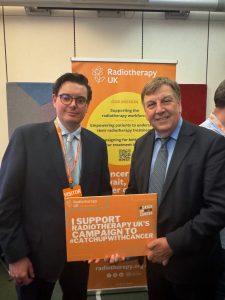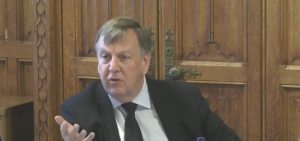
On 1 October 2014, Lord Risby and John Whittingdale took part in the ‘Ukraine and Europe: Peace and Development’ roundtable organised in Vienna by the German-Ukraine Forum.
They joined more than 150 other influential politicians and experts from Germany, Austria, Ukraine, the UK and France in discussing the ways of resolving the current crisis in Ukraine. Chairman of the British Ukrainian Society, Lord Risby, moderated a panel discussion which also included the BUS Director John Whittingdale as a panel speaker.
Lord Risby noted that, despite many difficulties which lie ahead for Ukraine in the next few weeks, the upcoming elections will be a watershed in the life of the country. “With a new Parliament, the European track, and the other things that will flow from it, I hope and believe this will be a new beginning.”
With the continuing military conflict in the East of Ukraine, Mr Whittingdale began with expressing his admiration for the courage of the people of Ukraine and his complete support against absolutely unacceptable aggression.
Continuing on that subject, Mr Whittingdale noted that, while the UK has recently faced its own separatist movement with the Scottish referendum, it was crucial that they followed a democratic process, unlike what has unfortunately happened in Ukraine.
He went on to explain the importance of power decentralisation in countering separatist movements. ‘In fighting the Scottish independence campaign, one of the arguments we used was to say that we understood that people in Scotland felt distant from London, they were too remote. And therefore we did say that the Scottish Parliament should have more power, and more responsibility.’
However Mr Whittingdale stressed that such decentralisation should not be limited to only a particular part of a country. ‘If you devolve power, and I believe very strongly in devolving power, you have to do it right across the board. So we are now having a debate about transferring those powers to other bodies within England, and Whales, and then further down.’
He also explained that the devolution of power should go down to the lowest level, including city level. ‘I certainly believe that power is exercised more effectively at a lower level, and that people will be more confident that the decisions that are taken at that level take account of their own interests. And that they will also be more engaged in the political process. Those are the kinds of reforms which I think also need to be part of the new Ukraine.’
Speaking further about reforms in Ukraine, Mr Whittingdale also offered an insight into how the United Kingdom succeeded in building its strong political institutions. He underlined that more needs to be done on that front in Ukraine, and that the UK is ready to offer its help and advice. The British MP particularly stressed the importance of having a strong parliament which would hold the government accountable, as well as having independent media and a strong government opposition in Ukraine.
He went on to assure that the United Kingdom is aware of its obligations under the Budapest Memorandum of which it is one of the signatories, and that the UK will not turn its back on Ukraine. ‘In a few weeks’ time when a new Ukrainian Parliament is elected I want Britain, and indeed all of Ukraine’s other friends, to work with the new Ukrainian Parliament so that you can build a free, democratic and prosperous country. And we stand ready to give you support.’
In his concluding remarks, Lord Risby stressed that Ukraine cannot escape from its geography and that dialogue with Russia should be pursued. ‘There are some very big hurdles to overcome because of what is going on in the East of Ukraine, the capture of Crimea which was completely illegal and utterly wrong.’
‘In the end, perhaps there has to be some out of the box thinking as to whether there could be an extended Customs Union with Russia or a free trade area to gradually normalise the situation.’ He added that there is a process under way whereby such proposals are constantly being put for discussion. And even though that process has not been particularly successful thus far, it is certainly happening.
Resulting from the roundtable discussions, a Memorandum was concluded setting out a roadmap for resolving the conflict in Ukraine. According to the Memorandum, the conflict can only be resolved by means of peaceful negotiations. While Russia has to respect the territorial integrity of Ukraine, the latter should pursue decentralisation of power so that its regions enjoy greater independence. The status of Crimea should be determined by an agreement between the two countries, while greater economic integration and cooperation should be pursued between the EU and Russia.


